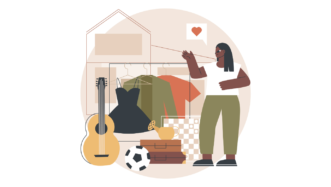LESSON OVERVIEW
In this lesson students practise their listening skills, revise sense verbs and learn to describe objects using sense verbs and adjectives.
SENSE VERBS AND ADJECTIVES
To introduce the topic of senses, you could start the lesson by eliciting the names of seven senses. Most students probably haven’t heard of vestibular and proprioception, so they’ll be interested. The aim of the first activity from the worksheet is to check whether students know the meaning of eight adjectives which are typically used with specific sense verbs (e.g. stinky, smooth, rotten). Students read eight sentences with underlined adjectives and have to decide whether they are true or false. This way they’ll learn the meanings of the adjectives. In the following task, students are given more adjectives which they classify into five groups – depending on a sense verb they collocate with (e.g. it tastes sour, it feels rough). Then, they put the sense verbs and adjectives into practice through a guessing game. In turns, they describe different types of food to their partners and try to guess them. Afterwards, students read five statements including the sense verbs and adjectives and discuss them.
VIDEO & PRACTICE
In the second part of the lesson students watch a video about a woman who lost her sense of smell. Before watching it for the first time, they look at five words related to the woman’s life and try to predict what happened to her. They watch the video to check if they were right. Next, students listen for details and decide if the given sentences about the video content are true or false. The listening practice is followed by a discussion. The final task gives students the opportunity to practise the sense verbs and adjectives from the previous stage. They write descriptions of two objects using at least five or six adjectives from the lesson. Then, exchange the descriptions with a partner and guess which objects they have described.
WORKSHEETS
Subscribe to unlock these and many other Standalone lesson with the Premium plan
Subscribe












Thank you Kasia!
I hope you liked it 🙂
Thank you! I’m excited to use this in my class tomorrow, I love the short video inclusions~
I hope it went well 🙂
What a great lesson! Thank you!
Thank you for this comment 🙂
Wonderful lesson! Thank you so very much!
Happy to hear that 🙂